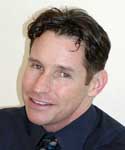-
- University of Pittsburgh hunger striker finally feels vindicated
- Vt. judge finds woman in contempt over lesbian custody battle
- Activists say they aren’t satisfied with civil unions
- ACLU says new law has chilling effect on free speech
- Same-sex marriage lobbying group begins doling out contributions
- Second judge strikes down Washington’s same-sex marriage ban
- National News Briefs
- World News Briefs
commentary
Anti-gay programming and local radio
Published Thursday, 16-Sep-2004 in issue 873
Beyond the Briefs
Gay radio and television is finally here. That’s important, but we are not quite there yet. Unless one wants to pay for radio or cable TV, our public airwaves still showcase homophobic and the heterosexist views often featuring the religious right. Yes, there is now Air America, but does one station that treats people with respect make up for the thousands that make profit from bashing people?
Clear Channel Communications owns over a dozen local stations and 1200-plus nationwide. One of its local San Diego stations features three radio personalities who have over the years generated high ratings largely from making disparaging comments about the GLBT community. No need to repeat the views of Rush Limbaugh, Dr. Laura, or the homophobic comments from Roger Hedgecock.
It’s suffice to note that Hedgecock has used the public airwaves, which are owned by the American people and licensed by the Federal Communications Commission (FCC), in order to organize a group called the “Normal People” whose purpose was to disrupt the Pride parade a number of years ago.
None of us can quarrel with someone expressing homophobic views in a newspaper or on the Internet because the local paper is not subsidized by tax funds nor is a private website, but the public airwaves are an entirely different story.
Congress, in allowing private entities to use public TV and radio frequencies, requires these businesses to “operate in the public interest.” The Communications Act established the FCC to regulate radio and TV stations and their programs.
The recent controversy over Janet Jackson’s “malfunctioning costume” and the fining of Howard Stern by the FCC has made it clear that the government does have the power to regulate public airways in the public’s interest. How is it in the public’s interest to operate stations that broadcast views designed to castigate segments of the population? Clear Channel Communications owns 1,200 radio and television stations. How many radio and television stations are owned by gays and lesbians? There are none that I am aware of.
Over 30 years ago, in FCC v. Pacifica Radio, the Supreme Court upheld the power of the FCC to regulate language used on radio and television. The public radio station suffered the wrath of the FCC when it aired a broadcast by comedian George Carlin. Carlin uttered the seven words you can’t say on radio and TV.
How is it in the public’s interest to operate stations that broadcast views designed to castigate segments of the population? Carlin and the station argued to the Supreme Court that electronic media has to be treated exactly the same as print media. The government can’t fine a newspaper for printing the so-called “seven words”, why treat the electronic media differently?
The court noted that the public airwaves are a rare commodity. No one can simply get on the air and broadcast over radio frequencies. Second, the court found that public stations broadcast to the public at large, including children. Arguably, the broadcasters have to be concerned about airing programming at times when children are likely to hear offensive words.
After the FCC v. Pacifica Radio, radio and television broadcasters sought refuge from Congress. They realized they weren’t going to get the Reagan administration to allow them to air offensive programs. But, in the spirit of deregulation, the media giants convinced Congress to repeal the Fairness Doctrine, a law that prevented the likes of Rush Limbaugh, Dr. Laura, Roger Hedgecock and the rise of hate radio.
Prior to 1984, stations risked losing their licenses if they failed to allow those with opposing viewpoints to express their views on radio and television.
It’s largely the same policy that addresses equal time rules for candidates. If a station airs a program about Gov. Arnold Schwarzenegger, then it has to give equal time to other candidates.
Without the “fairness doctrine”, the damage has been that millions of Americans have received doses of anti-gay, anti-women, anti-choice, etc. on a daily basis without a counterpoint.
But things are changing. The FCC is aggressively watching offensive speech and calling stations to account for broadcasts that are degrading.
While no one wants our public airwaves controlled by government sensors, perhaps it’s time to tell private commercial broadcasting companies like Clear Channel that they should operate exclusively on the Internet, where any organization can broadcast their program.
|
|
Copyright © 2003-2025 Uptown Publications


